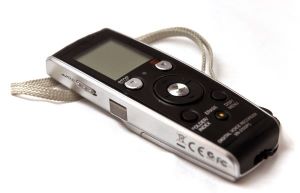While a journalistic interview seems like a chummy experience at first glance, it can often be a complicated dance. The interviewer has to build rapport and keep the subject engaged in conversation while also keeping in mind that the person you are talking to isn’t your customer or boss.
As someone who has worked most of the past dozen years freelance, I often liken it to that of a substitute teacher (a job I have also suffered) in that you have to maintain boundary lines with your subjects or you’ll get walked all over.
As you start to talk with the source, there’s usually a sussing out on both sides. It self-consciously happens in every conversation but this is a heightened experience since the stakes are higher.

From your end, you’re trying to figure out what kind of a source they are. Nearly all sources have something they want out of it: They could have something to promote (often more the case in soft journalism), they could have a message they want to get out, or they need to look good (especially in the case of a publicity representative). If not, why are they participating?
To what degree do they have skin in the game and how far are they willing to go to control the final product? I find it best not to be overt about the transactional nature of this relationship. If they see you as little more than a promotional vessel, let them be the first to put their foot in their mouth with that mistaken assumption.
In the interim, show your professionalism. This is what’s at stake for them: The source is taking a leap of faith that their story is in good hands.
But there’s a catch: You can only show them so much. The person you interview is not your boss.
At the very end of something like 80% of all interviews I have ever conduct ed, there will be the uncomfortable moment when the subject asks if they see the piece before it goes to publication. The answer is always no. But here’s the kicker: You have the upper hand. You already have the answers and you are free to publish it. At that point, you can stop interviewing them and write your story. Remember, you are being chummy, but it is a transaction and they’re asking you to do something that will compromise your job.
At the same time, in most situations with regard to local journalism, you absolutely need to be diplomatic at the very least. Outright hostility is not going to go over well and if you get a complaint, it could even cost you standing or your job. This is why it’s important to be cordial but clear about your boundaries.
The best thing to do is show them a well-written piece illustrating the industry standard like this.
What you can do is read quotes back to the source AT YOUR DISCRETION.
You also should mention that it’s not your final copy that goes into print because it goes through an editor anyway. It’s a good-cop-bad-cop variation where I say “oh, I’d love to help you, but the editor has his rules.”
Besides, this can been prone to happen when an editor (hopefully, you won’t have one of these) puts you in a bad situation. I once wrote a story about a local stamp and coin store and the editor made the unusual decision not to have me to correspond with the stamp owner about areas of concern. I told the stamp owner next time he called that I was unable to discuss the piece any further. He rightfully got very upset that I broke a promise to him. A few years later, I passed by his shop and I apologized about the whole thing. On another occasion, an editor asked me to grill the subject to the point of exhaustion and I had to perform the most tactful of high wire acts in explaining how not in control I was.
Some sticky situations can also originate from the subjects. In a story of a Salvadorean pupeseria and the owner’s son originally gave a great interview but decided that there was sensitive material that his father didn’t want to share about an ongoing Civil War. I had to make a hard decision about how to proceed. I compromised with him about not writing new material or asking the owner new questions but I researched around what I didn’t have and published an article with more quotes from outside family members than originally planned.
As is often the case with most participants who are iffy about participation, they ended up liking the article despite their momentary hesitation.
And that’s what your job is about: Extracting information while building trust. As previously mentioned, you can’t do it by being transactional. In other words, you can’t entice them with what you can give them (technically you can, but it doesn’t work well, despite what TV shows like “Inventing Anna” will have you believe). On the other hand, you can promise that if they weigh in on this important story, it will be faithfully told and that the process will be as unintrusive as possible on their time. It’s an art. If done right, most subjects will see the benefit of following your lead.
BIO: Orrin Konheim is a freelance writer centering in local journalism with publication credits in over three dozen publications over the past dozen years including the Washington Times, the Washington Post, Smithsonian Magazine, the Richmond Times-Dispatch, Gothamist, and Virginia Magazine. His body of work can best be seen at https://muckrack.com/orrin-konheim.
4675760 © Vladyslav Surnin | Dreamstime.com
Leave a Reply